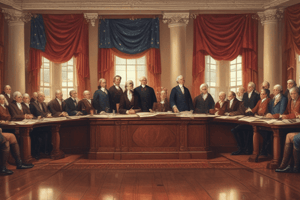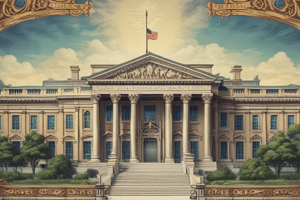Podcast
Questions and Answers
What is the term for the process of adding to something larger, such as absorbing new territory into a state?
What is the term for the process of adding to something larger, such as absorbing new territory into a state?
- Annexation (correct)
- Imperialism
- Expansion
- Xenophobia
Who was the commander of the Continental Army in the Revolution and the first President of the United States?
Who was the commander of the Continental Army in the Revolution and the first President of the United States?
- Booker Washington
- Abraham Lincoln
- Andrew Johnson
- George Washington (correct)
What is the term for the Declaration issued by the president or governor that has the force of law?
What is the term for the Declaration issued by the president or governor that has the force of law?
- Edict
- Executive Order
- Decree
- Proclamation (correct)
What is the term for the occupation of a space as an act of civil disobedience to promote change?
What is the term for the occupation of a space as an act of civil disobedience to promote change?
Who was the enslaved man who lost the Supreme Court case for citizenship and freedom?
Who was the enslaved man who lost the Supreme Court case for citizenship and freedom?
What is the term for the fear or hatred of foreigners or of anything that is strange or foreign?
What is the term for the fear or hatred of foreigners or of anything that is strange or foreign?
What is the term for the mandatory enlistment of people in military service?
What is the term for the mandatory enlistment of people in military service?
What is the term for the temporary control exerted by a country’s army over another territory?
What is the term for the temporary control exerted by a country’s army over another territory?
What was the primary purpose of the Olive Branch Petition in 1775?
What was the primary purpose of the Olive Branch Petition in 1775?
Which of the following documents prohibited slavery north of the 36-30 parallel in western territories of the US?
Which of the following documents prohibited slavery north of the 36-30 parallel in western territories of the US?
What was the significance of the Civil Rights Act of 1964?
What was the significance of the Civil Rights Act of 1964?
What was the primary purpose of the Emancipation Proclamation?
What was the primary purpose of the Emancipation Proclamation?
What was the significance of the first 10 amendments to the US Constitution?
What was the significance of the first 10 amendments to the US Constitution?
What was the significance of the 13th Amendment to the US Constitution?
What was the significance of the 13th Amendment to the US Constitution?
What was the significance of the Plessy v. Ferguson Supreme Court decision?
What was the significance of the Plessy v. Ferguson Supreme Court decision?
What was the significance of the Kansas-Nebraska Act?
What was the significance of the Kansas-Nebraska Act?
What was the name of the British law that forbade colonists from settling west of the Appalachians?
What was the name of the British law that forbade colonists from settling west of the Appalachians?
Which group of journalists was known for exposing social, economic, and political injustices in the early 20th century?
Which group of journalists was known for exposing social, economic, and political injustices in the early 20th century?
What was the name of the alliance formed by Germany, Austria-Hungary, and the Ottoman Empire during World War I?
What was the name of the alliance formed by Germany, Austria-Hungary, and the Ottoman Empire during World War I?
Who were the African American military pilots who fought in the air force during World War II?
Who were the African American military pilots who fought in the air force during World War II?
What was the name of the constitutional amendment that abolished slavery in the United States?
What was the name of the constitutional amendment that abolished slavery in the United States?
Who were the Native American code talkers who used their native languages to transmit messages for the US military?
Who were the Native American code talkers who used their native languages to transmit messages for the US military?
What was the name of the group of activists who challenged illegal segregation on buses in the South during the 1960s?
What was the name of the group of activists who challenged illegal segregation on buses in the South during the 1960s?
Who were the businessmen who used exploitative practices to amass wealth during the Industrial Revolution?
Who were the businessmen who used exploitative practices to amass wealth during the Industrial Revolution?
Flashcards are hidden until you start studying
Study Notes
US Government and History
- The first frame of the US government was known for limitations to federal power.
- The Continental Congress wrote a letter to the king in 1775 to attempt to avoid war.
- The Bill of Rights is the first 10 amendments to the US Constitution, which sealed its ratification.
- The Emancipation Proclamation was an executive order changing the legal status of slaves in the Confederacy to free.
- The Civil Rights Act of 1964 was a significant legislation passed during the Civil Rights Movement.
History of Slavery
- The Missouri Compromise prohibited slavery north of the 36-30 parallel in western territories of the US.
- The Emancipation Proclamation was an executive order changing the legal status of slaves in the Confederacy to free.
- The 13th Amendment formally abolished slavery and involuntary servitude after the Civil War.
Supreme Court Decisions
- The Brown v. Board of Education decision was a landmark case in the Civil Rights Movement.
- The Plessy v. Ferguson decision established the "separate but equal" doctrine.
Wars and Military
- The Olive Branch Petition was a letter written by the Continental Congress to the king in 1775 to attempt to avoid war.
- The Fourteen Points were a set of principles outlined by President Woodrow Wilson for peace after World War I.
- The Lend-Lease Act was a policy that allowed the US to supply military aid to its allies during World War II.
- War bonds were papers sold to citizens during war to raise state funds, which were later bought back.
- The Selective Service System was a process of mandatory enlistment of people in military service, also known as a draft.
People
- George Washington was the Commander of the Continental Army in the Revolution and the first President of the US.
- Thomas Jefferson wrote the Declaration of Independence and was the first Secretary of State and third President.
- Dred Scott was an enslaved man who lost a Supreme Court case for citizenship and freedom.
- Abraham Lincoln was a President of the US who played a key role in the abolition of slavery.
- Booker Washington was a prominent African American educator and activist.
Political Agreements and Legal Matters
- The Proclamation of 1763 was a British law that forbade colonists from settling west of the Appalachians.
- The Intolerable Acts were a series of laws that imposed a direct tax on the British colonies of America.
- The Articles of Confederation was an early constitutional document that governed the US during the American Revolution.
- The Antitrust Act prohibits monopolies and anticompetitive conduct among businesses.
Other Terms
- Xenophobia is a fear or hatred of foreigners or anything that is strange or foreign.
- A sit-in is a form of civil disobedience where people occupy a space to promote change.
- A tariff is a tax on imported goods.
- War guilt is a clause that requires a country to pay for damages caused during war.
- Diplomacy is a method of influencing foreign governments through dialogue and negotiation.
- Mobilization is the process of assembling and readying military troops and supplies for war.
- Occupation is the temporary control exerted by a country's army over another territory.
Studying That Suits You
Use AI to generate personalized quizzes and flashcards to suit your learning preferences.





